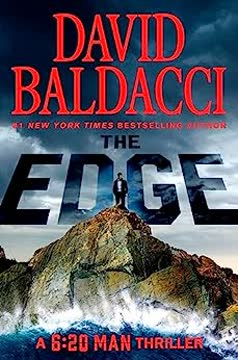Plot Summary
Arrival in Carter Crossing
Jack Reacher, a former military cop, is sent undercover to the small town of Carter Crossing, Mississippi, to investigate a murder linked to a nearby military base. The town is divided between its civilian and military populations, creating a tense atmosphere. Reacher's mission is to discreetly gather information and report back, but he quickly realizes the situation is more complicated than it seems. The local sheriff, Elizabeth Deveraux, a former Marine, is deeply connected to the town and committed to justice. Reacher must balance his orders with the truths he uncovers, navigating the complexities of the town's dynamics.
Deveraux's Investigation Begins
Elizabeth Deveraux, the determined sheriff of Carter Crossing, is investigating the murder of Janice May Chapman, a young woman found with her throat cut. Despite her military background, Deveraux faces the challenge of a case potentially involving soldiers from the nearby base. Skeptical of Reacher's presence, she nonetheless recognizes his skills. Together, they begin to peel back the layers of secrecy surrounding the case, uncovering potential motives and suspects. Deveraux's resolve to find justice for Chapman is unwavering, even as she navigates the investigation's complexities.
Secrets and Suspicions Unveiled
As Reacher delves deeper, he discovers the murder isn't isolated. Two other women were killed similarly, suggesting a serial killer. The town's residents are tight-lipped, and the military base is cloaked in secrecy. Reacher's instincts point to the base as the key, but accessing it is challenging. He relies on his wits and Deveraux's local knowledge to piece together the puzzle. The tension between military and civilian worlds becomes more apparent as Reacher navigates loyalty and duty's murky waters.
The Mysterious Blue Car
A breakthrough occurs when Reacher finds a wrecked blue car near the railroad tracks. The car's license plate traces back to a soldier at the base, but the information is quickly classified, raising more questions. Reacher suspects a cover-up and is determined to uncover why the car is crucial. The car's discovery adds a new layer to the investigation, suggesting the murder may be linked to a larger military conspiracy. Reacher's determination to uncover the truth puts him at odds with his superiors and local authorities.
Confrontations and Confessions
Reacher's presence in Carter Crossing attracts attention, leading to conflicts with local troublemakers, the McKinney cousins. These confrontations highlight the tension between the town's residents and military personnel. Reacher's skills and reputation as a formidable investigator are tested as he navigates these challenges. Meanwhile, Deveraux continues her investigation, uncovering more about the victims and their connections to the base. The pressure mounts as Reacher and Deveraux race against time to prevent another murder.
A New Homicide Discovered
The investigation takes a grim turn when another body, a male journalist, is discovered near the base. The circumstances suggest a connection to the ongoing investigation, but the military denies involvement. Reacher and Deveraux must determine if the journalist's death is linked to the previous murders or a separate incident. The discovery raises the stakes, forcing Reacher to question the motives of those around him, including his superiors.
Dinner and Deception
As the investigation progresses, Reacher and Deveraux grow closer, both professionally and personally. Over dinner, they discuss the case and their suspicions about the military's involvement. Deveraux reveals her doubts about the official narrative and her determination to find the truth. The dinner marks a turning point in their relationship, as they realize they must rely on each other to solve the case. The evening ends with mutual respect and a shared commitment to uncovering the truth, despite the risks.
Midnight Train and Deadly Secrets
In the quiet Mississippi night, Reacher and Deveraux share a passionate moment by the railroad tracks, underscored by the rumble of the midnight train. This setting symbolizes the collision of their personal and professional lives. As the train roars past, it becomes clear that the secrets they are entangled in are as unstoppable as the locomotive. The train's passage marks a turning point, foreshadowing the unraveling of the mystery surrounding the murders in Carter Crossing.
Confrontation on the Railroad Tracks
Reacher orchestrates a tense confrontation on the tracks with Captain Reed Riley and his father, Senator Carlton Riley, on the railroad tracks. With the train approaching, Reacher forces them to confess their roles in the cover-up of the murders. The senator's influence and the captain's reckless behavior are laid bare, revealing a web of corruption and deceit. Reacher's interrogation is relentless, and the truth emerges: the Rileys have manipulated events to protect their reputations, sacrificing innocent lives in the process.
Deveraux's True Allegiances Revealed
As the investigation reaches its climax, Deveraux's true loyalties are questioned. Initially suspected of being involved in the murders, she proves her integrity by standing with Reacher against the powerful forces trying to bury the truth. Her past, marred by accusations and a fabricated file, is revealed to be a manipulation by those seeking to protect the Rileys. Deveraux's determination to seek justice for the victims aligns her with Reacher, solidifying their partnership and mutual respect.
The Senator's Sinister Cover-Up
Senator Carlton Riley's involvement in the cover-up is exposed as a desperate attempt to protect his son and his political career. The senator's influence extends deep into the military and political systems, showcasing the lengths to which he will go to maintain his power. His actions have far-reaching consequences, implicating him in a conspiracy that spans from Mississippi to Washington, D.C. The senator's downfall is a testament to the destructive power of unchecked ambition and corruption.
A Final Reckoning at Midnight
In a dramatic showdown, Reacher ensures that justice is served. The Rileys' attempt to escape accountability is thwarted as Reacher orchestrates a final reckoning on the railroad tracks. The midnight train, a symbol of inevitability, becomes the instrument of their demise. This climactic moment underscores the theme of justice prevailing against all odds, as Reacher's unwavering pursuit of the truth brings closure to the victims' families and restores order to Carter Crossing.
Reacher's Departure and New Beginnings
With the mystery resolved and justice served, Reacher prepares to leave Carter Crossing. His departure marks the end of a tumultuous chapter and the beginning of a new journey. As he walks away, Reacher reflects on the events that transpired, the lives affected, and the personal connections he formed. His path is uncertain, but his resolve remains unshaken. The open road beckons, promising new adventures and challenges for the lone wanderer.
Characters
Jack Reacher
Reacher is a former military cop whose investigation into the murders in Carter Crossing uncovers a web of corruption and deceit. His unwavering determination to uncover the truth and deliver justice drives the narrative. Reacher's moral compass and investigative skills make him a formidable force against the powerful figures trying to cover up their crimes. His interactions with Deveraux reveal his capacity for trust and collaboration, even as he grapples with the complexities of the case.
Elizabeth Deveraux
Deveraux is the sheriff of Carter Crossing, initially suspected of involvement in the murders. Her military background and personal connection to the town drive her commitment to finding justice for the victims. As the investigation unfolds, Deveraux's integrity and loyalty are tested, but she ultimately proves to be a steadfast ally to Reacher. Her character development highlights her resilience and determination to stand against corruption, even at great personal risk.
Senator Carlton Riley
Senator Riley is a powerful figure whose political ambitions drive him to orchestrate a cover-up to protect his son. His influence extends deep into the military and political systems, showcasing the lengths he will go to maintain his power. Riley's actions have far-reaching consequences, implicating him in a conspiracy that spans from Mississippi to Washington, D.C. His downfall is a testament to the destructive power of unchecked ambition and corruption.
Captain Reed Riley
Captain Riley is the son of Senator Carlton Riley and the commander of Bravo Company. His reckless behavior and sense of entitlement lead to a series of tragic events, including the murders in Carter Crossing. As the investigation unfolds, Riley's true nature is revealed, exposing his involvement in the crimes and his father's desperate attempts to protect him. His character serves as a cautionary tale of the dangers of unchecked privilege and power.
Janice May Chapman
Janice May Chapman is the young woman whose murder sets off the investigation. Her beauty and mysterious past make her a compelling figure, and her connections to the military base raise questions about her involvement with the soldiers. Chapman's death is the catalyst for the unfolding events, and her story becomes central to the investigation as Reacher and Deveraux seek to uncover the truth about her life and death.
The McKinney Cousins
The McKinney cousins are a group of local men who confront Reacher during his investigation. They represent the tension between the town's residents and the military personnel, and their confrontations with Reacher highlight the challenges he faces in navigating the complex social dynamics of Carter Crossing. The cousins' presence adds an element of danger to the investigation, as Reacher must contend with their hostility while pursuing the truth.
Plot Devices
Undercover Investigation
The undercover investigation is a central plot device in the story, as Reacher is sent to Carter Crossing to gather information discreetly. His mission requires him to navigate the delicate balance between his orders and the truth he uncovers. The undercover aspect adds tension and complexity to the narrative, as Reacher must maintain his cover while working with Deveraux and investigating the murder.
Military Secrecy
The military base near Carter Crossing is shrouded in secrecy, and its connection to the murder is a key plot device. The base's operations and the soldiers' involvement in the case are central to the investigation, and the military's attempts to protect its reputation add layers of complexity to the narrative. The secrecy surrounding the base creates tension and raises questions about the true motives of those involved.
Serial Killer Pattern
The discovery of two previous murders with similar circumstances suggests the presence of a serial killer in Carter Crossing. This plot device raises the stakes for Reacher and Deveraux, as they must determine if the murders are connected and if the killer is still at large. The pattern of murders adds urgency to the investigation and forces the characters to confront the possibility of a larger conspiracy.
Romantic Tension
The romantic tension between Reacher and Deveraux is a subplot that adds depth to the narrative. Their evolving relationship reflects their growing trust and mutual respect, and their personal connection becomes a driving force in their pursuit of the truth. The romantic tension adds an emotional layer to the story, highlighting the personal stakes for both characters as they navigate the challenges of the investigation.
The Midnight Train
The midnight train serves as a powerful symbol throughout the narrative, representing the unstoppable force of justice and the inevitability of the truth coming to light. Its presence underscores key moments in the story, from Reacher and Deveraux's intimate encounter to the final reckoning on the tracks. The train's passage marks turning points in the investigation, highlighting the themes of justice and retribution.
Fabricated Evidence
The fabricated file on Deveraux is a key plot device that reveals the extent of the Rileys' manipulation and corruption. The file, intended to discredit Deveraux and protect the Rileys, ultimately unravels under scrutiny, exposing the truth behind the murders. This plot device underscores the theme of deception and the lengths to which powerful figures will go to maintain their influence.
Confrontation on the Tracks
The confrontation between Reacher and the Rileys on the railroad tracks serves as the story's climax, where the truth is finally revealed, and justice is delivered. This plot device brings the narrative full circle, tying together the themes of justice, retribution, and the consequences of unchecked power. The setting on the tracks, with the approaching train, heightens the tension and underscores the inevitability of the Rileys' downfall.
Analysis
"The Affair" by Lee Child is a gripping exploration of justice, corruption, and the moral complexities of uncovering the truth. Through the character of Jack Reacher, the narrative delves into the challenges of navigating a world where power and influence often overshadow justice. The story highlights the destructive nature of unchecked ambition and the lengths to which individuals will go to protect their reputations. The evolving relationship between Reacher and Deveraux adds an emotional depth to the narrative, emphasizing the importance of trust and collaboration in the pursuit of justice. The novel's themes resonate with contemporary issues of power dynamics and the quest for truth, making it a compelling read for those interested in the intricacies of human nature and the fight for justice.
Last updated:
FAQ
Synopsis & Basic Details
What is The Affair about?
- Undercover Mission Unravels: Jack Reacher, an elite military police major in 1997, is sent undercover to Carter Crossing, Mississippi, to investigate the murder of a young civilian woman, Janice May Chapman, whose death is linked to a nearby Ranger training base, Fort Kelham. His orders are to control the local police and ensure the military's reputation remains untarnished.
- Uncovering Deeper Crimes: Reacher quickly discovers the murder is not an isolated incident, but part of a pattern of similar killings of local women. He forms an uneasy alliance with Sheriff Elizabeth Deveraux, a former Marine MP, as they uncover a conspiracy involving powerful figures, including a U.S. Senator and his son, who are desperate to protect their reputations.
- Justice Beyond Orders: The investigation forces Reacher to confront the moral ambiguities of his mission, as he realizes the military is actively covering up the truth. He ultimately chooses to pursue justice for the victims, leading to a dramatic confrontation that reshapes his future and sets him on the path to becoming the lone wanderer readers know.
Why should I read The Affair?
- Reacher's Origin Story: This novel offers a unique glimpse into Jack Reacher's past, detailing the pivotal events in 1997 that led him to leave the military and become the nomadic, justice-seeking character of the later series. Readers gain insight into his formative experiences and the moral lines he refused to cross.
- Intricate Military Procedural: Lee Child masterfully blends a small-town murder mystery with a high-stakes military cover-up, showcasing the complexities of jurisdiction, loyalty, and political influence within the armed forces. The story provides a compelling look at how power can corrupt and the lengths people go to protect it.
- Compelling Character Dynamics: The evolving relationship between Reacher and Sheriff Elizabeth Deveraux is a highlight, moving from initial suspicion to a deep professional and personal bond. Their shared military backgrounds and commitment to justice create a powerful partnership against formidable adversaries.
What is the background of The Affair?
- Post-Cold War Military Context: Set in 1997, the novel reflects a period of significant transition for the U.S. military, with discussions of force reductions ("reductions in force are coming") and new, covert missions like the deployment of Rangers to Kosovo. This backdrop highlights the pressures on military personnel and the political sensitivities of the era.
- Rural Mississippi Setting: Carter Crossing is depicted as a dying small town ("This place is dying, Reacher. We need that base open, and fast"), heavily reliant on the nearby Fort Kelham for its economy. This economic dependency creates a complex dynamic between the civilian population and the military, influencing local law enforcement and social interactions.
- Racial and Socioeconomic Divides: The story subtly explores the racial and socioeconomic stratification of rural Mississippi, particularly through the victims. The "black half of town" and the "white half" are distinct, and the differing reactions to the murders of black women versus a white woman highlight systemic inequalities and the challenges of achieving justice for all.
What are the most memorable quotes in The Affair?
- "Sometimes if you want to know for sure whether the stove is hot, the only way to find out is to touch it.": This quote, repeated by Reacher, encapsulates his direct, empirical approach to problem-solving and risk assessment, even when facing dangerous situations. It defines his willingness to confront threats head-on.
- "Everyone has a plan until they get punched in the mouth.": Reacher delivers this line to the McKinney cousins, a brutal and pragmatic truth that reflects his understanding of conflict and human nature. It highlights his belief that real-world chaos often overrides meticulous planning.
- "The army's loss is the Marine Corps' gain. And you're their granddaddy too. So professionally you didn't give a damn. It was your son you were protecting.": Reacher's cutting accusation to Senator Riley exposes the core motivation behind the cover-up: personal ambition and familial protection overriding military ethics and justice. It reveals the depth of the corruption.
What writing style, narrative choices, and literary techniques does Lee Child use?
- Sparse, Direct Prose: Child employs a minimalist, no-nonsense writing style, characterized by short sentences and paragraphs, focusing on action and observation. This mirrors Reacher's own pragmatic and efficient mindset, creating a fast-paced, immersive reading experience.
- First-Person Limited POV: The story is told entirely from Reacher's perspective, allowing readers deep access to his internal monologue, observations, and deductions. This narrative choice builds suspense as readers experience the mystery unfolding through Reacher's unique lens, often privy to his thoughts before his actions.
- Foreshadowing and Callbacks: Child subtly weaves in details and seemingly throwaway lines that gain significance later, such as the repeated mentions of the "midnight train" or Reacher's initial assessment of his hair for undercover work. This technique creates a tightly woven plot where seemingly minor elements contribute to the larger narrative.
Hidden Details & Subtle Connections
What are some minor details that add significant meaning?
- Reacher's Civilian Disguise: Reacher's choice of "mud-colored canvas pants" and a "maroon" (faded to pink) shirt, along with his unkempt hair and worn brogues, are meticulously detailed. This highlights his "method acting" approach to undercover work, emphasizing his commitment to blending in and the novelty of civilian life for him.
- The Hotel Owners' Routine: The old couple running the Toussaint's hotel, who spend their evenings reading in the diner, are not just background characters. Their predictable routine and the hotel's low occupancy (2 out of 28 rooms) subtly underscore the dying nature of Carter Crossing and the impact of the base's lockdown on local businesses.
- The McKinney Cousins' Appearance: The repeated description of the McKinney cousins as having "fur, ink, hair, dirt, grease" and their "smug, low-wattage insolence" immediately establishes their character as local troublemakers. This visual shorthand quickly communicates their rural, unrefined nature and their inherent hostility towards outsiders, particularly soldiers.
What are some subtle foreshadowing and callbacks?
- Garber's Hair Comments: Leon Garber's initial lecture to Reacher about army hair regulations, followed by his immediate approval of Reacher's "ragged and unkempt" look for undercover work, subtly foreshadows the unconventional nature of the mission and Reacher's eventual break from military conformity.
- The Pentagon's Overmanning: Early mentions of the Pentagon being "seriously puffed up and overmanned" and the inevitability of "reductions in force" foreshadow Reacher's eventual involuntary separation from the army. It sets the stage for the systemic pressures that will ultimately lead to his departure.
- Deveraux's "Rich Uncle" Allusion: Elizabeth Deveraux's wistful comment about having "a rich uncle" who showed her the world, which Reacher immediately recognizes as a military allusion, subtly reveals her past as a Marine MP. This callback to a common military phrase immediately establishes a shared understanding and connection between them.
What are some unexpected character connections?
- Deveraux's Marine Corps Past: The revelation that Sheriff Elizabeth Deveraux was a Chief Warrant Officer 5 in the Marine Corps Provost Marshal's office is a significant and unexpected connection. This shared military police background immediately establishes a deep professional understanding and mutual respect between her and Reacher, despite their initial adversarial roles.
- Reacher's Beirut Experience: Reacher's casual mention of his Silver Star being earned during a "routine liaison visit to a Marine encampment in Beirut, Lebanon," where he was caught in a truck bombing, links him directly to a real-world historical event and subtly connects him to Deveraux's Marine background, as she would have been aware of such incidents.
- The Senator's Son's Dating Pattern: The discovery that Captain Reed Riley dated all three murder victims (Rosemary McClatchy, Shawna Lindsay, and Janice May Chapman) and also Sheriff Elizabeth Deveraux, creates a shocking and unexpected web of connections. This pattern reveals Riley's predatory nature and the depth of the personal stakes involved for Deveraux.
Who are the most significant supporting characters?
- Major Duncan Munro: Munro serves as Reacher's foil and eventual ally. Initially presented as the "ace" investigator on the base, his professional competence and eventual willingness to cooperate with Reacher (despite orders) highlight the internal conflicts within the military and the pursuit of truth.
- First Sergeant Frances Neagley: Neagley is Reacher's fiercely loyal and highly competent former colleague. Her ability to gather intelligence quickly and her unwavering support, even when Reacher is in danger, underscore the deep bonds formed within their specialized unit and provide crucial plot advancements.
- Stan Lowrey: Lowrey, Reacher's MP colleague, acts as a vital source of information from the "sergeants' network" and the broader military grapevine. His casual gossip and willingness to help Reacher, despite the risks, illustrate the informal but powerful intelligence channels within the army.
Psychological, Emotional, & Relational Analysis
What are some unspoken motivations of the characters?
- Reacher's Quest for Purity: Beyond his orders, Reacher is driven by an unspoken need for absolute justice and moral clarity. His disgust with the cover-up and the Rileys' corruption stems from a deep-seated desire for the military to uphold its ideals, even if it means sacrificing his own career.
- Deveraux's Legacy and Self-Worth: Elizabeth Deveraux's fierce commitment to solving the murders, particularly after the initial two black victims were ignored, is driven by a desire to honor her father's legacy as a "firm, but fair" sheriff and to prove her own competence and integrity in a male-dominated, racially divided environment.
- Senator Riley's Image Obsession: Senator Carlton Riley's extreme measures to protect his son are rooted in an almost pathological obsession with his public image and political career. His actions are less about paternal love and more about maintaining an unblemished facade for his constituents and the Armed Services Committee.
What psychological complexities do the characters exhibit?
- Reacher's Detachment and Empathy: Reacher displays a complex blend of emotional detachment (e.g., his clinical analysis of violence, his lack of personal possessions) and profound empathy (e.g., his visceral reaction to Bruce Lindsay's death, his concern for Emmeline McClatchy). This duality allows him to operate effectively in brutal situations while retaining a strong moral compass.
- Deveraux's Resilience and Vulnerability: Elizabeth Deveraux, despite her tough Marine MP background and stoic demeanor, reveals moments of deep vulnerability and frustration, particularly when discussing the systemic indifference to the earlier victims or her own past "mistakes." Her ability to maintain composure while carrying immense emotional burdens highlights her psychological strength.
- Riley's Narcissism and Entitlement: Captain Reed Riley embodies extreme narcissism and a dangerous sense of entitlement, believing he is above consequences due to his father's influence. His casual cruelty and lack of remorse for his actions reveal a sociopathic personality, driven by self-gratification and a disregard for others' lives.
What are the major emotional turning points?
- Discovery of Bruce Lindsay's Body: The death of Bruce Lindsay, the "ugly boy" whom Reacher had encouraged to join the army, is a major emotional turning point for Reacher. It transforms the investigation from a professional duty into a deeply personal quest for retribution, fueling his determination to expose the Rileys.
- Deveraux's Fabricated File Revelation: The moment Elizabeth Deveraux learns about the fabricated Marine Corps file designed to discredit her is a significant emotional blow. It forces her to confront the depth of the conspiracy against her and solidifies her resolve to fight alongside Reacher, cementing their partnership.
- Reacher's Final Break from the Army: Reacher's decision to mail his involuntary separation papers at the Pentagon, rather than fighting to stay, marks his ultimate emotional and professional break from the military. It signifies his disillusionment with the institution's corruption and his choice to pursue justice on his own terms.
How do relationship dynamics evolve?
- Reacher and Deveraux: From Adversaries to Lovers: Their relationship begins with mutual suspicion, as Reacher is undercover to "control" her, and Deveraux immediately "rumbles" him. It evolves into a professional alliance based on shared principles, then deepens into a passionate romance, culminating in their intimate encounters and mutual support against the Rileys.
- Reacher and Munro: Professional Rivals to Tacit Allies: Initially, Munro is presented as Reacher's younger, more ambitious counterpart, sent to lead the "official" investigation. Their dynamic shifts from professional rivalry to a grudging respect and eventual tacit alliance, as Munro, a "good MP," recognizes the truth of Reacher's claims and assists him.
- Riley Father and Son: Symbiotic Corruption: The relationship between Senator Carlton Riley and Captain Reed Riley is a chilling portrayal of symbiotic corruption. The father uses his power to protect his son's reckless behavior, while the son's actions provide the father with political leverage (e.g., "hero" status for Kosovo). Their bond is transactional, built on mutual benefit and a shared disregard for morality.
Interpretation & Debate
Which parts of the story remain ambiguous or open-ended?
- The Full Extent of Military Complicity: While Senator Riley's direct involvement in the cover-up is exposed, the exact number of high-ranking military officials aware of or complicit in the scheme remains ambiguous. Reacher speculates about "five or six different chains of command," leaving the true depth of institutional corruption open to interpretation.
- Deveraux's Future in Carter Crossing: Despite her integrity being proven to Reacher and Munro, Deveraux's long-term future as Sheriff of Carter Crossing remains uncertain. The political fallout from the Rileys' deaths and the town's economic struggles ("This place is dying") suggest a challenging path ahead, leaving readers to wonder if she will stay or eventually leave.
- Reacher's Post-Military Path: The novel concludes with Reacher walking away from the Pentagon, a "citizen of a country I had barely seen," with an open road ahead. While this sets up his iconic nomadic lifestyle, the specific nature of his future purpose and how he will sustain himself (beyond his separation pay) is left entirely open-ended.
What are some debatable, controversial scenes or moments in The Affair?
- The Killing of the Tennessee Free Citizen: Reacher's execution of the "runt" militia member who confessed to killing Bruce Lindsay and the journalist is highly controversial. While the man was a confessed murderer, Reacher acts as judge, jury, and executioner, raising questions about vigilantism versus due process and the morality of extrajudicial killings.
- The Deaths of Senator and Captain Riley: Reacher's deliberate orchestration of the Rileys' deaths by the midnight train is a climactic but morally ambiguous act. Was it justice, or was it revenge? The scene forces readers to confront the limits of conventional justice and whether Reacher's actions, though effective, align with ethical principles.
- The Sexual Encounter on the Railroad Tracks: The passionate encounter between Reacher and Deveraux on the tracks, immediately after the discovery of Rosemary McClatchy's foot, is debatable. Some readers might find it a powerful symbol of life amidst death and a raw expression of human connection, while others might view it as insensitive or inappropriate given the grim circumstances.
The Affair Ending Explained: How It Ends & What It Means
- The Rileys' Demise: Inevitable Justice: The novel culminates in Reacher trapping Senator Carlton Riley and Captain Reed Riley on the railroad tracks, where they are struck and killed by the midnight train. This act is Reacher's ultimate delivery of justice, using the train as a symbol of unstoppable, impersonal fate. It signifies that even the most powerful figures cannot escape accountability for their crimes, especially when they involve the innocent. The Rileys' deaths are presented as a direct consequence of their arrogance and the systemic corruption they embodied.
- Reacher's Departure: Embracing the Nomad Life: Following the Rileys' deaths, Reacher is involuntarily separated from the army, a consequence of his actions and the military's desire to distance itself from the scandal. He chooses not to fight this separation, recognizing that the institution he served has become compromised. His final act of mailing his separation papers and hitchhiking away symbolizes his definitive break from conventional life and his embrace of the nomadic, justice-seeking existence that defines his character in subsequent novels. This ending explains the genesis of the iconic Jack Reacher.
- Deveraux's Resilience and the Town's Future: Sheriff Elizabeth Deveraux, having witnessed Reacher's extreme measures, remains committed to her role, albeit with a deeper understanding of the forces at play. Her decision to publicly attribute the murders to the dead militia member, protecting the army's reputation while ensuring some form of closure, highlights her pragmatic approach to justice in a complex world. The town of Carter Crossing, though scarred, is left with a chance to heal, its economic lifeline (Fort Kelham) restored, and its deep-seated issues subtly acknowledged but not fully resolved.
Review Summary
The Affair is the 16th Jack Reacher novel, set in 1997 as a prequel detailing Reacher's last case as an Army MP. Readers appreciate the backstory and character development, praising Child's writing and plot twists. The book explains why Reacher left the Army and sets up future storylines. While some criticize the casting of Tom Cruise in the movie adaptation, most fans enjoy the action, suspense, and Reacher's affair with the local sheriff. Overall, it's considered one of the stronger entries in the series.
Jack Reacher Series
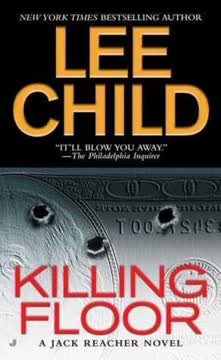
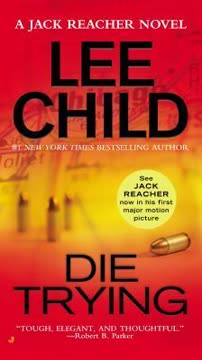
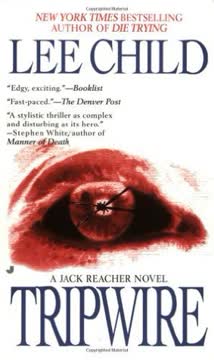
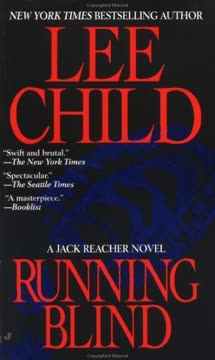
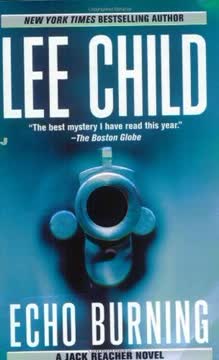
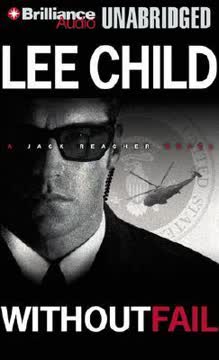
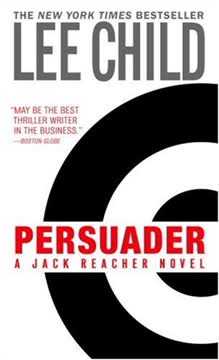
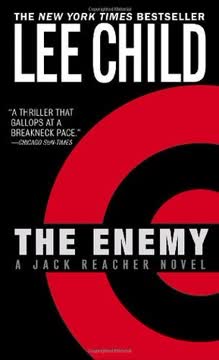

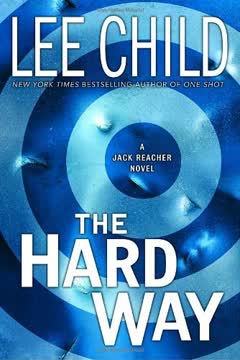
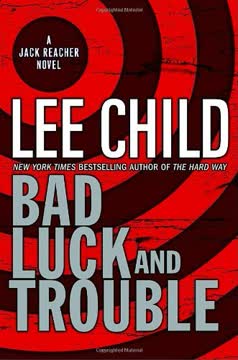
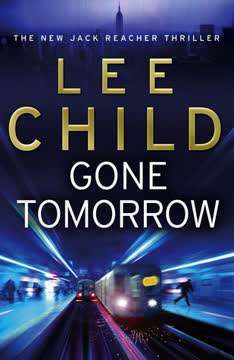
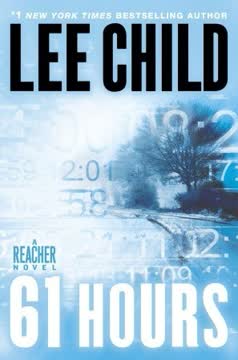
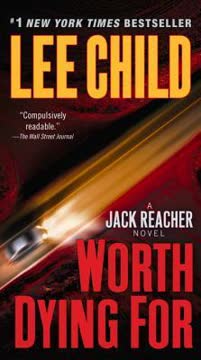
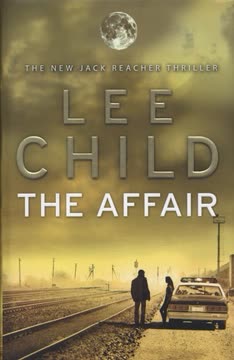



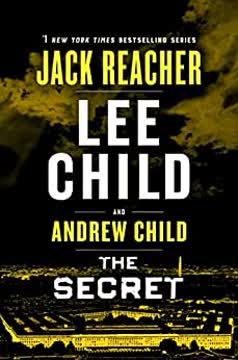
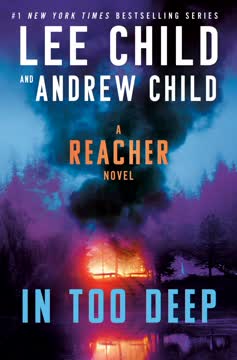
Similar Books
Download PDF
Download EPUB
.epub digital book format is ideal for reading ebooks on phones, tablets, and e-readers.
